In the future, we see much chaos, deep social cleavages, and ever-rising inequality leading to growing poverty, deforestation, and climate change. One thing is clear: now more than ever we need better business models designed to solve these problems rather than continue to add to them.
With FairChain and Moyee, we’re building our company around Economic, Social and Environmental impact. The latest environmental impact update is in the CO2 performance ladder. We hope it inspires you to make a difference! Thanks for all the support over the years and… Lets fix the future!
We started Moyee Coffee as a social enterprise, a business whose main objective was to deliver social impact and not shareholder profit. In those early days, when we first began to champion the cause of the smallholder coffee farmer we started offering, 20% premiums on coffee beans, twice what any other fair trade or ethical endeavor was offering. We thought this was pioneering and considered ourselves serious crusaders but little did we know.
By working with 100 smallholders in rural Ethiopia to improve the quality of their beans, we soon realized that our 20% premium was not nearly enough to provide our farmers with a decent income – not by a long shot! While our premium was helping farmers increase their annual coffee revenues from €400 to €500 our work with the farmers and research into a living income helped us understand that most coffee farmers would need to double and even triple take home pay from coffee to provide for the basic needs of food, health, education, shelter and a little savings that their families would need to escape poverty. We quickly realised that rather than the ‘the world’s fairest coffee company’ a more truthful description might have been to describe ourselves as ‘the world’s least unfair coffee company.’ Put simply, we went back to the drawing board to radically update our theory of change. In close collaboration with the FairChain Foundation, we developed a program that would “bring a living income to farmers by managing profitable farms and getting involved in value adding activities in order to improve the livelihoods and communities”. We pivoted thus from a 20% FairChain Premium towards a Living Income Differential.
Real impactful change, a living income for our farmers we realised will take time but we’re on a journey and season by season we are helping more and more farmers and their families to thrive while growing the finest fairchain coffee beans that are good for planet and people. Looking back over the past few years, we have continuously questioned the significance of our social impact. We are learning by doing. Our 20% FairChain premium payments have of course grown as our sales volumes have grown, which directly benefits farmers and their communities. We also know that this premium isn’t enough. Which is why we are focused on a concept we call the Living Income Differential, which gives us a much better understanding of our impact and how much we have closed the gap towards a living income.
We track our progress in three clear ways:
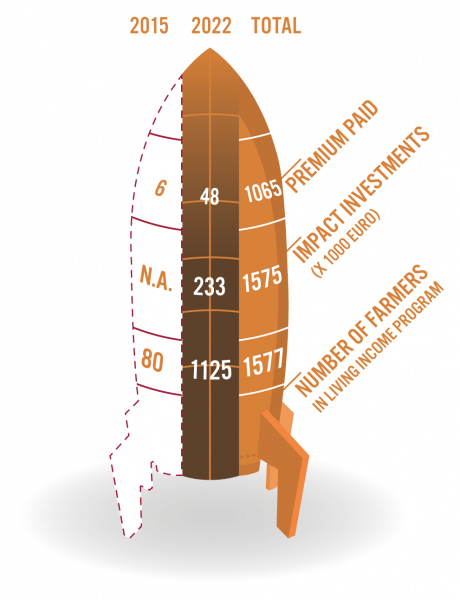
We paid €1,065,000 in FairChain premium for our blends from Ethiopia and Kenya. On average we paid 300% more than the Fairtrade minimum price to our Ethiopian farmers. In Kenya we pay 20% on top of the farmer coop selling price set with other buyers.
In 2022, we invested €233,000 in our Livable Income program.
This brings the total to €1,575,000 since the program began.
The number of FairChain farmers in Ethiopia and Kenya has grown to 1,577. but also introduced sustainable composting to 2,500 Kenyan coffee farmers who will soon be supplying us with a low chemical coffee to be FairChain coffee.
Living income is defined as sufficient income generated by a household to afford a decent standard of living for the household members. Elements of a decent standard of living include: a nutritious diet, clean water, decent housing, education, healthcare, transport, clothing and other essential needs, including a provision for unexpected events. Our living income differential is made up from the investment we make in programs that contribute to our Living Income Roadmap.
Our goal, however, is to replace these investments by paying a Living Income Reference Price to our farmers. This is the price needed for an average farmer household with a viable farm size and an adequate productivity level to make a living income from selling their crops.
A living income is defined as sufficient income generated by a household to afford a decent standard of living for the household members. Elements of a decent standard of living include: a nutritious diet, water, decent housing, education, healthcare, transport, clothing and other essential needs, including a provision for unexpected events. Because the road to a living income is not straight, we invest in a wide variety of activities to increase our odds of succeeding. Higher prices are only part of the solution – higher yields, lower production and living costs are needed as well.
The investment are admittedly high in the beginning, but become less as we reap the quality, yield and price benefits of our interventions. The average income for an Ethiopian farming family of 7 is €521 annually. Our living income benchmark is €1,055, which is based on coffee and non coffee incomes earned by our farmers in Limmu, Ethiopia. Since we began researching living income in our chain we have made it the central focus of our interventions. It has not always been easy to establish benchmarks due to, among other things, a bad harvest in 2018. So we created a pool of 100 farmers in Limmu to better assess the impact of our interventions. Before our interventions, these farmers earned €267 annually from coffee. Our intervention increased their income to €598. Close to what is need for a living income, but in 2019 it dropped dramatically to go up again in 2020.
While continuing to work closely with and carefully monitor the progress of Limu 1 farmers, we have also begun a new living income intervention with 200 Ethiopian farmers (Limu 2). In 2021, we will expand our living income program to 12,000 farmers in southern Ethiopia and 2,600 farmers in Kenya. During this time, we will also unveil a campaign to reach new roasters to embrace and test our model.
The FairChain model aims to help farmers achieve living incomes not only by improving quality and yields but also by lowering production costs, invest in digitization, access to credit and healthcare. On top of that our coffee tree planting has the aim to double farmer income. We believe that the FairChain model has the potential to replace development aid in countries rich in natural resources, such as coffee.
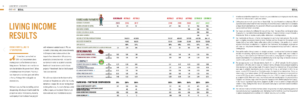
When it comes to impact, size does matter. However, we see growth as a means, not an end. The more kilos you drink the more farmers we can support in our FairChain Farming program. These farmers are amongst the smallest and poorest in the region and have lived in poverty for generations.
Our Living Income Roadmap is their best – and often only – chance to turn their lives around. Our FairChain Farming program is instantly scalable and can accommodate up to 12,500 farmers. These are enough farmers to change the fate of an entire region and a significant upgrade for many, many farmers and their families.
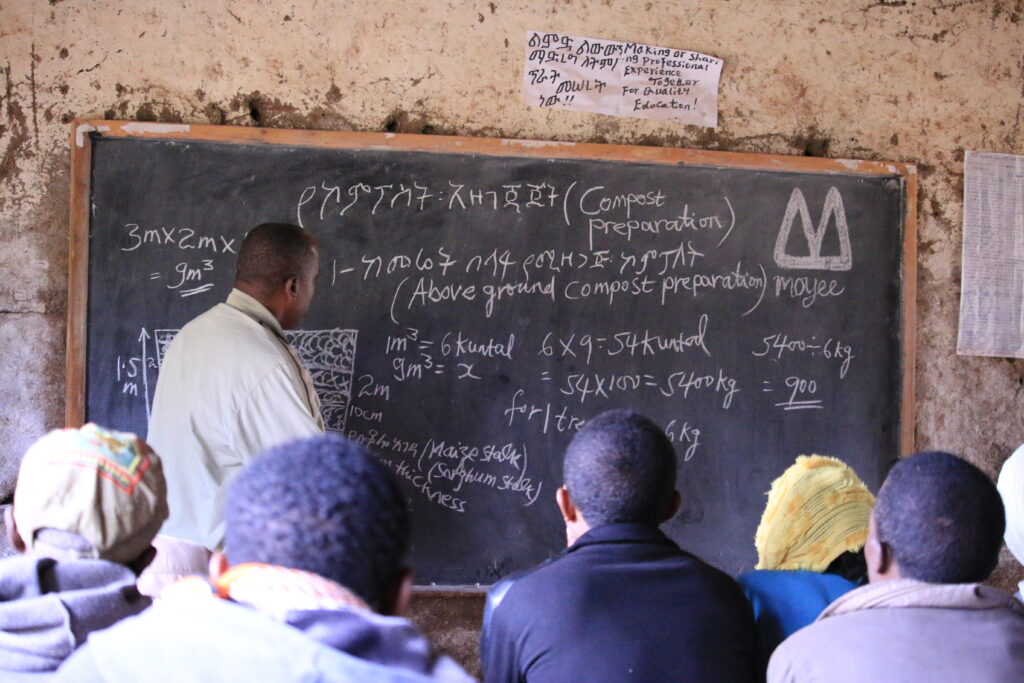
Most of our farmers have less than one hectare of land and produce on average just 180 kg of green beans per hectare. It is absolutely essential then that we help them rejuvenate and/or replace their existing coffee trees in order to increase the quality of their beans and the size of their yields.
Planting trees plays an incredibly important role in our Living Income Roadmap. Last year we successfully supplied the first 35,000 seedlings to our farmers. We also invested heavily in two nurseries so that we can increase that number to 400,000 seedlings a year.
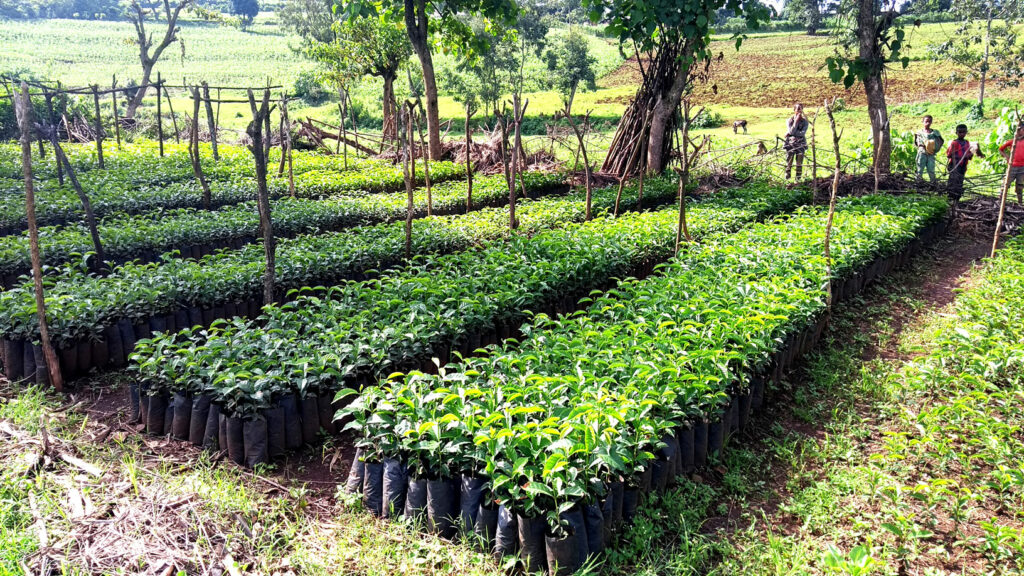
In 2017, we were the first coffee company to put our farmer payments on the blockchain. We have continued to do so ever since.
Using the blockchain is not only a way to deliver on our brand promise or live up to radical transparency, it also gives us much better insights into our farmers’ earning capacity. This opens the door to farmer credit lines. It makes it possible to bank farmers, the vast majority of whom have been written off as unbankable.
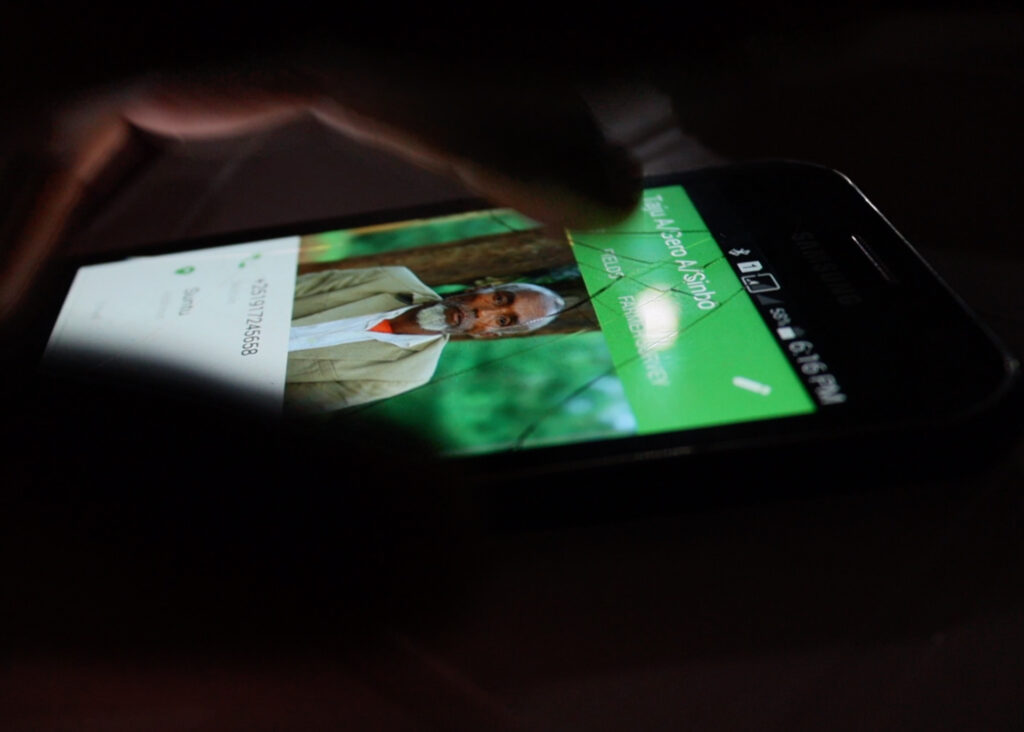
Our FairChain colleagues spent the entire 2019 harvest in Limu, Ethiopia, opening some 371 new farmer bank accounts. 93 of those bank accounts were for women. The local bank couldn’t believe their eyes! Thanks to these bank accounts, farmers now have ID cards and digital wallets. Fast forward to now, and over 570 farmers have access to digital wallets.
Digital wallets are perfectly suited to farmer needs: they provide a reliable banking system that doesn’t require paper and gives them direct access to the bank. Another important advantage is that digital wallets empower women by giving them ownership over their own accounts. Finally, Moyee fans can contribute directly to farmers’ digital wallets without having to go through a middleman, including us!
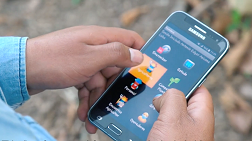
We recently invested in the first FairChain wet mill, which we hope will lead to additional income for our farmers. Traditionally, wet mills are owned by wealthy farmers or co-ops who in turn keep most of the profits.
The profits generated by our FairChain wet mill will be shared with the farmer community. At the same time, our wet mill adds value by creating 118 seasonal jobs, the majority of which go to women.
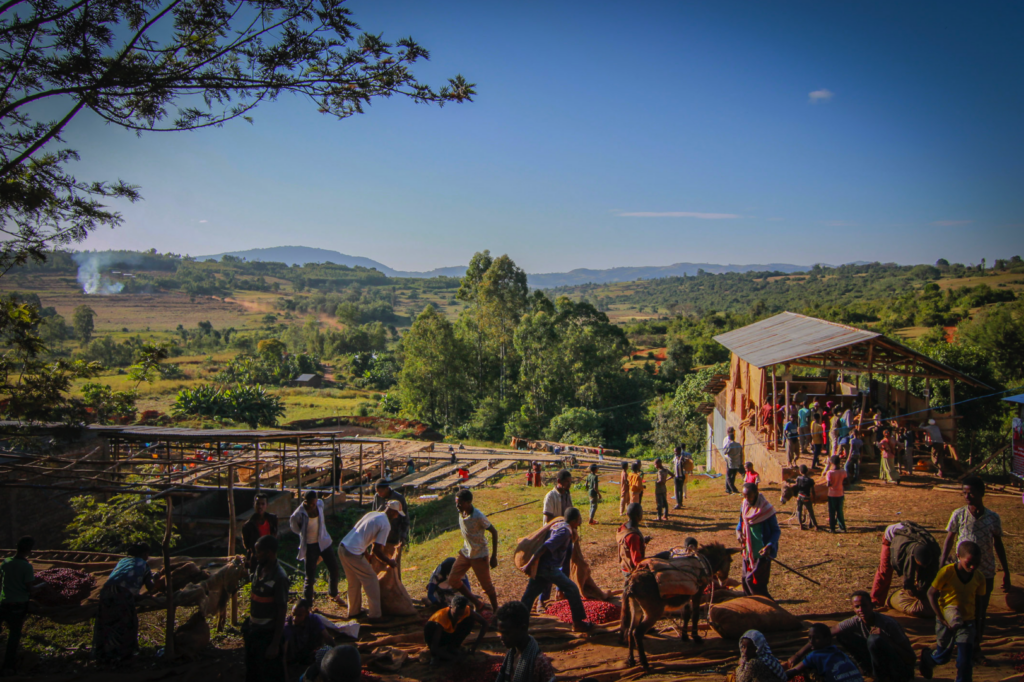
We are very much learning by doing. This is all new territory for us as well, but we know where we are heading. By 2025, we aim to have 5,000 farmers on a credible road to a living income while also proving that all of our first wave of farmers in our program have indeed closed the poverty gap.
As we progress we plan to:
Aside from all that we actually want to encourage other coffee companies to follow our lead, adopt our open-source methodology and technology and put another 5,000 farmers on the road to a living income.
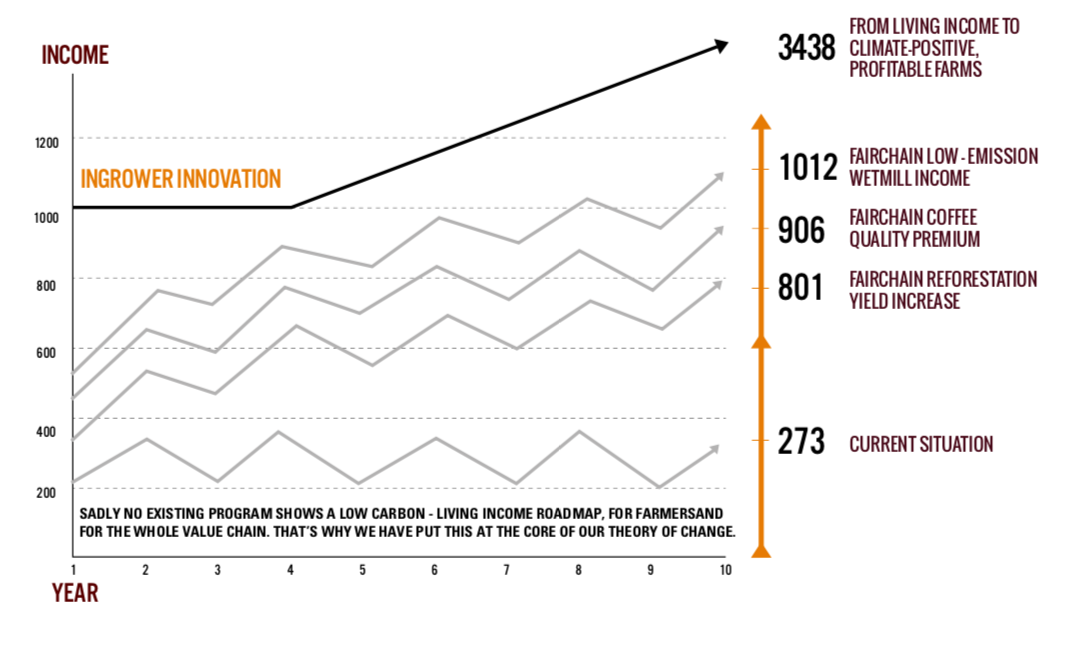
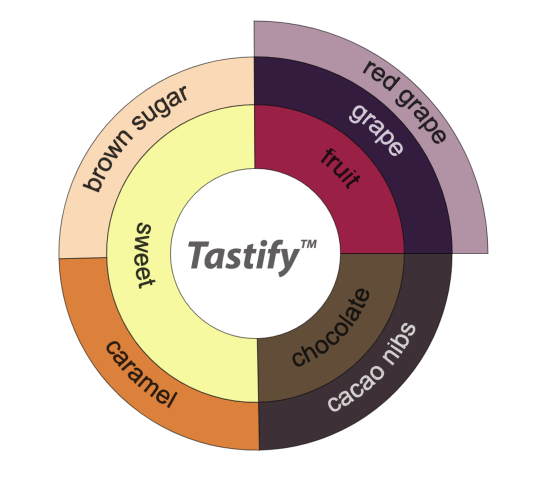
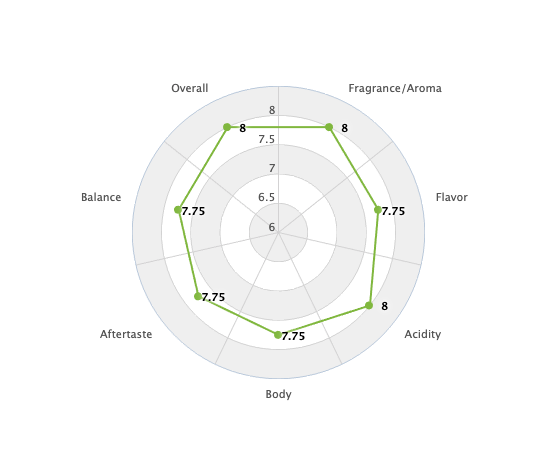
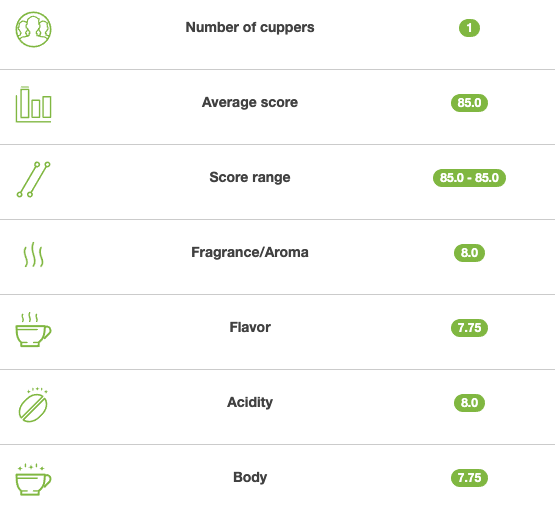
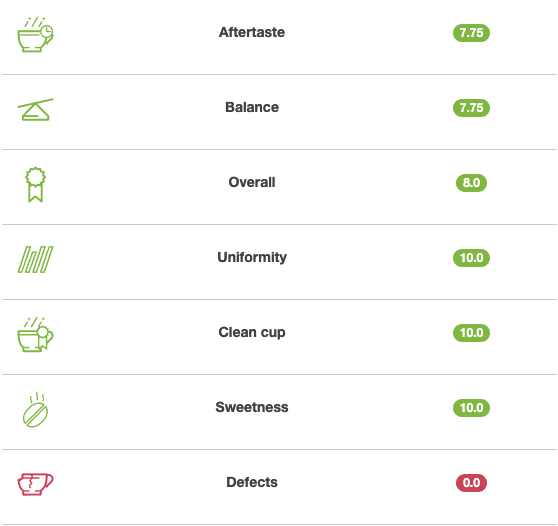
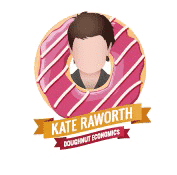 Our website uses cookies 🍪 but actually our model is a doughnut! 🍩 We'll assume you're ok with us using cookies to improve your browsing experience, but you can opt-out via thePrivacy Policypage if you wish.
Our website uses cookies 🍪 but actually our model is a doughnut! 🍩 We'll assume you're ok with us using cookies to improve your browsing experience, but you can opt-out via thePrivacy Policypage if you wish.